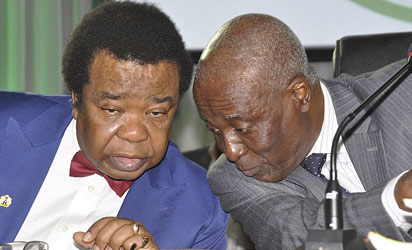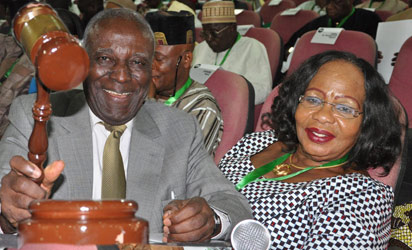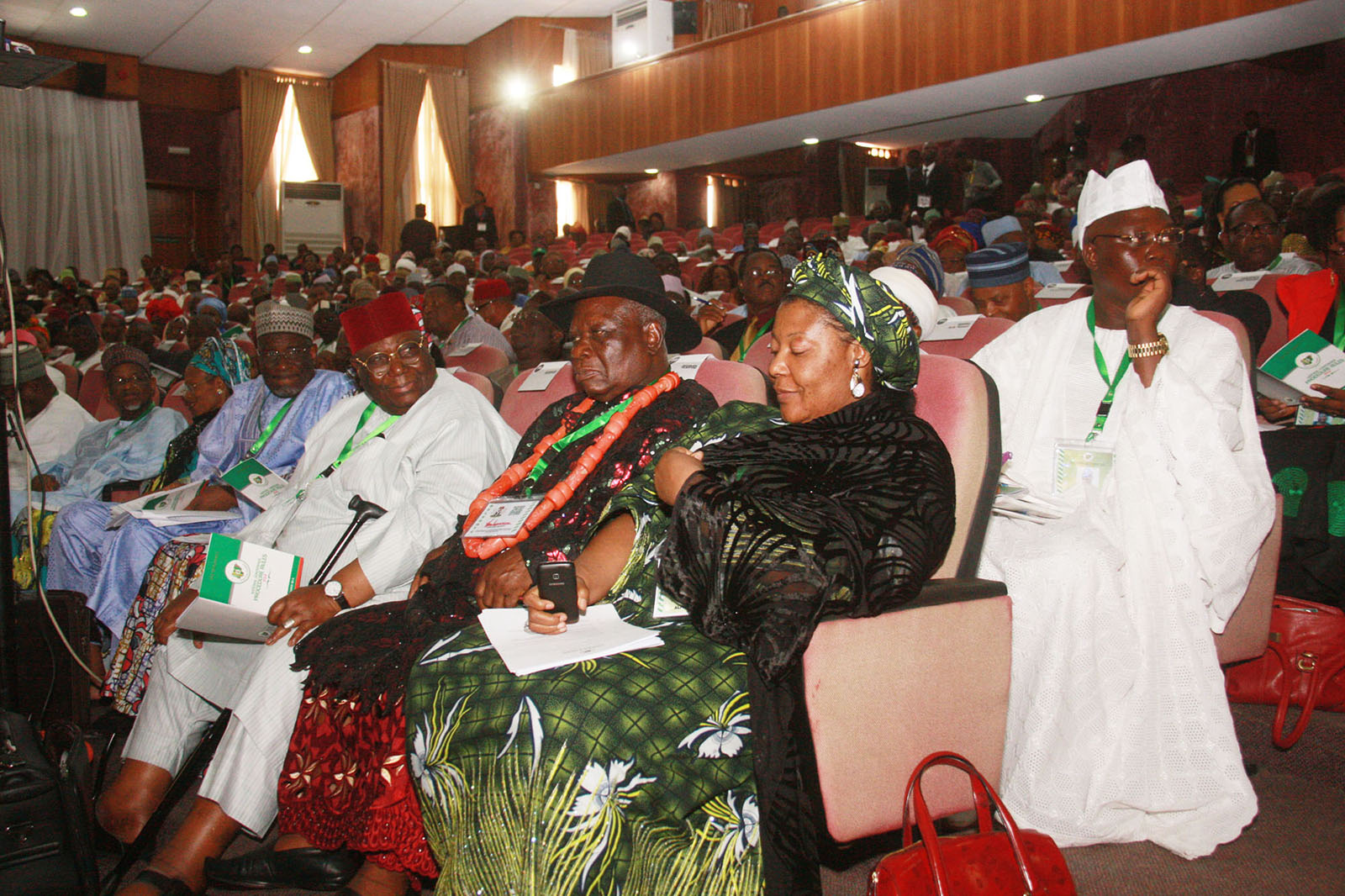The National Conference, an assemblage of 492 Nigerians, after three months of its original time frame with additional one month, would round off in four days time having completed the main assignment of plenary, committee work and voting on the recommendations of the committees.
Besides the 492 delegates, there are six principal officers namely: Conference Chairman, Justice Idris Kutigi; his deputy, Prof. Bolaji Akinyemi; Secretary, Mrs. Valerie Azinge; Assistant Secretary, Conference Proceedings, Dr. Akilu Indabawa; Assistant Secretary, Finance and Administration, Prof. Mahmood Yakubu; and Assistant Secretary, Media and Communications, Akpandem James.

President Goodluck Jonathan, as part of the moves to expand the space for political and social discourse; determine the future of Nigeria and create a new political direction for Nigeria, on 17 March, 2014 inaugurated the National Conference.
Before the Kutigi-led National Conference, Jonathan, on Monday, October 7, 2013, put in place the Senator Femi Okurounmu-led 13- member Presidential Advisory Committee on National Dialogue as a foundation to the conference.
At the end of its three-month exercise of brainstorming, the Okuruonmu committee, in January, submitted its 69-page report. Barely two months after the submission of the report, Jonathan nominated Kutigi as Chairman of the National Conference, alongside Akinyemi as Vice Chairman. Consequently, the president rolled out 492 names as delegates.
The list was made up of 37 elder statesmen, one each from the 36 states and the Federal Capital Territory, nominated by the president; retired military and security personnel from each of the armed forces, the police, the State Security Service and the Nigeria Intelligence Agency; traditional rulers, two per zone and one from the FCT; retired civil servants, one from each geo- political zone and the FCT; NLC and TUC whose nomination must reflect the geo- political zones and gender balance; the organised private sector with two nominations from NECA, MAN, NACCIMA, NESG; the media, professional bodies; women organisations; youth organisations, people with disability, among others.
Some of the big names as delegates include the South-south leader, Chief Edwin Clark; Dr. Tunji Braithwaite; Chief Ayo Adebanjo; Chief Richard Akinjide; Chief Olu Falae; Erelu Olusola Obada; General Ike Nwachukwu; Achike Udenwa; Chief Olusegun Osoba; Nduka Obaigbena; Chief Raymond Dokpesi; Senator Jim Nwobodo; Chief Mike Ahamba, SAN; Senator Azu Agboti; Chief Peter Odili; King Alfred Diete Spiff; Prof. Jerry Gana; Gen. Jonathan Temlong; Prof. Jubril Aminu; Alhaji Ahmadu Adamu Muazu; Arc. Ibrahim Bunu; General A. B. Mamman; General Alani Akinrinade (rtd; former Senate Presidents Adolphus Wabara, Iyorchia Ayu; Ken Nnamani; Chief Mike Ozekhome, SAN; Commodore Olabode George, rtd; General Zamani Lekwot (rtd); Gen Jerry T. Useni (rtd); Sen Daisy Danjuma, Charles Edosomwan, SAN and Ambassador Hassan Adamu.
LEADERSHIP
The conference itself was a test of leadership on the part of Kutigi and Akinyemi.
The first major challenge they handled was the adoption of 70% majority vote benchmark, just as the issue almost marred the conference. The bone of contention was whether voting pattern should be by two third, three quarter or 75% of delegates. A group of ‘50-wise men’ was put in place and the matter was resolved.
As the conference continued, humour adopted by Kutigi helped to relief tension especially when delegates resorted to threats. In one instance, the Lamido of Adamawa, Muhammadu Barkido Mustapha, during plenary, told other delegates that he would pack his luggage and whatever he had to join his kith and kin in Cameroon, but Kutigi and Akinyemi placated him.
Kutigi and Akinyemi had very firm control of plenary; they did not give room for critics to achieve their mischief on the rumoured secret agenda on the conference.
Even when a delegate, Ishaq Modibbo Kawu, raised a point of order that there were publications that Akinyemi was lobbying northern delegates to smuggle in a new Constitution, in their transparent manner, Kutigi asked his deputy to explain his own side of the story.
They understood the fact that they were leading people of different ages and backgrounds.
The confab leadership was able to handle the North and South divide by ignoring distractive points of order when voting on reports and recommendations commenced and they did not also give room for reversal of decisions reached.
To buttress the good leadership approach of Akinyemi, the Lamido of Adamawa, Mustapha, conferred on him the traditional title of Hasken Adamawa, meaning the light of Adamawa Kingdom.

According to Mustapha, in a letter to Akinyemi, the title was given to him due to the fairness, fearlessness, justness and firmness which he, the Lamido, witnessed during his three months of participating in the plenary of the National Conference.
THORNY ISSUES
Twenty committees were set up by the leadership of the conference, namely: Devolution of Powers, National Security; Environment; Politics and Governance; Political Restructuring and Forms of Government; Social Sector; Transportation; Science Technology and Development; Agriculture; Civil Society, Labour and Sports; Public Service; Foreign Policy and Diaspora Matters; Political Parties and Electoral Matters; Land Tenure and National Boundaries; Economy, Trade and Investment; Energy; Religion; Public Finance and Revenue; Immigration and Related Matters as well as Law, Judiciary, Human Rights and Legal Reform.
After weeks of brainstorming at the committee level which took place with memoranda from the public, summoning of ministers, heads of parastatals, government agencies, among others, the delegates churned out reports. In the last few weeks, the reports and recommendations were subjected to debates, votes, approval and adoption with the conference, at the end, dealing with very thorny issues.
Some very thorny issues the conference dealt with include power rotation between the North and South.
Another was immunity for elected public officers.
The conference threw out the contentious issue of 6- year single tenure for president, governors; it created additional state for the South-east as well as additional 18 states for the six zones with a zone getting three new states each, just as it reverted to the old National Anthem as against the present one.
The conference also voted in favour of Modified Presidential System of Government which combines the parliamentary and presidential systems.
Under the proposal, the president elected under the new system shall exercise full responsibility for his government and shall select ministers, not more than 18 of them, from the six geo-political zones of the country.
On local government administration, the conference voted that states should own their own constitutions while the functions of local governments as contained in Schedule 4 of the 1999 Constitution (as amended) have been transferred to the states subject to the power of the state Houses of Assembly to add or reduce the said functions of the local governments.
Delegates also approved the establishment of special courts like those to handle cases involving corrupt practices.
It was also agreed that hence forth anybody arraigned before the court by EFCC, ICPC and by any law enforcement agencies, the accused person will be regarded as guilty, unlike the present situation where he is innocent until proven guilty.
On the issue of state police, as controversial as it appears to be, a decision was taken that those who want it should have it.
The conference agreed that there will no sponsoring of Christian and Muslim pilgrimages to the holy lands, just as it resolved that churches and mosques will now pay tax to government.
After weeks of controversy over whether or not the Land Use Act be removed from the Constitution, the conference resolved to retain the law.
The conference also agreed that lawmaking should be on part- time basis.
There is succour for people living with disabilities as delegates voted that government at all levels should grant allowance to them which will be equivalent of government workers on grade level 06 as that would enable them employ aides to assist them carry out domestic activities.
Recommendation on the creation of a separate Foreign Service Commission was unanimously accepted by delegates.







